★★½
“A better trailer than a movie.”
 There seem to have been a spate of these recently. Not just zombie flicks – though there’s been no shortage of those – but zombie flicks set in or around strip clubs. This is the Japanese take, and follows more or less the expected pattern of such things, combining nudity, violence and self-awareness in varying degrees. At least initially, this is definitely leaning towards a 70’s, grindhouse aesthetic, but after a few minutes, that aspect vanishes, and never really returns. Instead, it’s a fairly straight-forward tale of a motley crew of stereotypical strippers, e.g. the money-hungry one, the intellectual one (who quotes George Bataille), who work at a pretty crap club in a spa town, but who find a tunnel leading across the street, which brings them to a book of dark magic and a well containing an apparently infinite supply of zombies.
There seem to have been a spate of these recently. Not just zombie flicks – though there’s been no shortage of those – but zombie flicks set in or around strip clubs. This is the Japanese take, and follows more or less the expected pattern of such things, combining nudity, violence and self-awareness in varying degrees. At least initially, this is definitely leaning towards a 70’s, grindhouse aesthetic, but after a few minutes, that aspect vanishes, and never really returns. Instead, it’s a fairly straight-forward tale of a motley crew of stereotypical strippers, e.g. the money-hungry one, the intellectual one (who quotes George Bataille), who work at a pretty crap club in a spa town, but who find a tunnel leading across the street, which brings them to a book of dark magic and a well containing an apparently infinite supply of zombies.
It takes its time getting that far, and given the title, it’s a lot more restrained in terms of nudity than you might expect. It’s clearly not intended to be taken seriously, and does seem to be riffing on the genre (another of the alternate titles is Hot Spring Zombies vs. Strippers 5). At one point, a character says, “Must be a cheap movie. They’re big recently. Like some girl fighting zombies with a sword” – perhaps a reference to Onechanbara, which is also echoed in some of the costumes. But the make-up is largely bargain-basement stuff, and so are most of the FX, with obvious wires at some points, and an over-reliance on unconvincing digital work.
The real problem here, is likely that it tries to be too many things, and ends up being not all that good at any of them. It’s a fairly poor zombie flick, and certainly can’t hold a candle to the uber-gory genre entries also coming out of Japan in the past few years. As noted, it’s pretty tame for a movie set where it is, and none of the more traditional aspects of cinema (characters, performances and script) are interesting enough to make up for those shortcomings on the grindhouse front. It doesn’t exactly outstay its welcome, at a brisk 73 minutes, and can be commended for that, and certainly being aware of (and, largely, not giving a damn about) its limitations. However, like many of its kind, the sizzle is considerably better than the steak.
Dir: Takao Nakano
Star: Sola Aoi, Risa Kasumi, Mari Sakurai, Tamayo
a.k.a. The Big Tits Dragon





 In contrast to
In contrast to 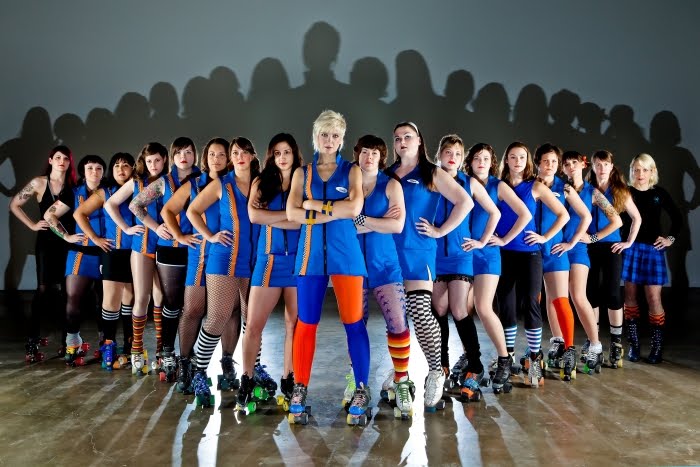 Not that there is any shortage of said personalities, such as the mother and daughter who both take part in the sport, or the three sisters who have been roller-skating virtually their entire life, and are feared across the entire Seattle league. There are, admittedly stories about romance and marriage included, but even these have a close connection to roller-derby, like the guy who proposes after his girlfriend became part of the championship-winning team [I can relate to this, having proposed to my wife immediately after the Arizona Diamondbacks won the 2001 World Series!]. I also enjoyed the insight into the different teams, like the Sockit Wenches (right) or the Derby Liberation Front, and the different ways in which they both perceive themselves and are perceived from the outside. Each has a different group personality, which of course, attracts other like-minded individuals, reinforcing that aspect of the team.
Not that there is any shortage of said personalities, such as the mother and daughter who both take part in the sport, or the three sisters who have been roller-skating virtually their entire life, and are feared across the entire Seattle league. There are, admittedly stories about romance and marriage included, but even these have a close connection to roller-derby, like the guy who proposes after his girlfriend became part of the championship-winning team [I can relate to this, having proposed to my wife immediately after the Arizona Diamondbacks won the 2001 World Series!]. I also enjoyed the insight into the different teams, like the Sockit Wenches (right) or the Derby Liberation Front, and the different ways in which they both perceive themselves and are perceived from the outside. Each has a different group personality, which of course, attracts other like-minded individuals, reinforcing that aspect of the team.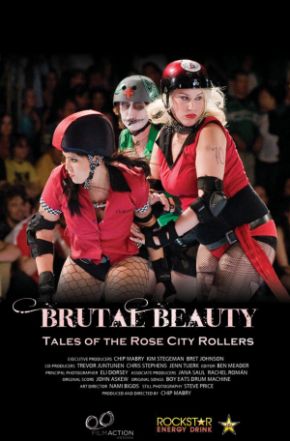 For the next entry, we leap forward to 2009, and Portland – a city which all we know about, we learned from Portlandia. And, on that basis, of course it’s a city which has roller derby, where it sprung, virtually fully-fledged to four-figure crowds. This is less of a landmark doc, in that it doesn’t cover the beginning, middle or end. It’s basically a year or so in the lives of the participants in the Rose City Rollers, which is the Portland league. It covers both their local season, and then, once that’s over, follows the travelling team, the Wheels of Justice, first as they head down to San Francisco to take on their hated rivals, then over to Denver for the regional championships.
For the next entry, we leap forward to 2009, and Portland – a city which all we know about, we learned from Portlandia. And, on that basis, of course it’s a city which has roller derby, where it sprung, virtually fully-fledged to four-figure crowds. This is less of a landmark doc, in that it doesn’t cover the beginning, middle or end. It’s basically a year or so in the lives of the participants in the Rose City Rollers, which is the Portland league. It covers both their local season, and then, once that’s over, follows the travelling team, the Wheels of Justice, first as they head down to San Francisco to take on their hated rivals, then over to Denver for the regional championships.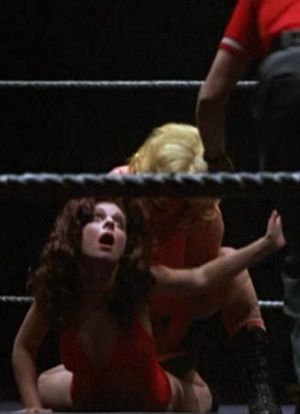 Rosa Rubinsky (Baff) is working as a waitress at a wrestling venue, when her swift dispatch of an over-affectionate coworker gets her noticed by a promoter (Bechler). He convinces her to try out, under the watchful eye of Mildred Burke [playing herself – she held the Women’s World Championship for about 20 years], and after some initial shock, discovers she likes the theatrical sport. Despite never having been outside the state of New York, she goes on the road, along with a set of other women wrestlers, and they travel up and down the East coast, putting on shows, though Rosa is still deemed too “green” to get in the ring. That changes after she meets the current women’s champion, Terrible Tommy (O’Brien, another genuine wrestler of the era). A bout for the belt is arranged, in which Rosa – known now as “Rosa Carlo, the Mexican Spitfire” – will take on Tommy for the title.
Rosa Rubinsky (Baff) is working as a waitress at a wrestling venue, when her swift dispatch of an over-affectionate coworker gets her noticed by a promoter (Bechler). He convinces her to try out, under the watchful eye of Mildred Burke [playing herself – she held the Women’s World Championship for about 20 years], and after some initial shock, discovers she likes the theatrical sport. Despite never having been outside the state of New York, she goes on the road, along with a set of other women wrestlers, and they travel up and down the East coast, putting on shows, though Rosa is still deemed too “green” to get in the ring. That changes after she meets the current women’s champion, Terrible Tommy (O’Brien, another genuine wrestler of the era). A bout for the belt is arranged, in which Rosa – known now as “Rosa Carlo, the Mexican Spitfire” – will take on Tommy for the title. If you’ve seen Bollywood films, you might expect the same here – a light, breezy romp, interspersed with gratuitous musical numbers. Wrong, on every conceivable level. It’s an almost unrelentingly grim portrayal of the life of Phoolan Devi (Biswas), sold off by her family at the age of 11, abused by her husband (Shrivastava) as well others in the higher-ranked Thakur caste, and basically treated worse than an animal. She’s eventually abducted by a gang of bandits, whose lieutenant Vikram (Pandey) is sympathetic to her: when the leader tries to rape her, Vikram shoots him in the head, and takes over, making Phoolan his co-chief. However, after the group’s true leader is released from prison, he’s none too happy, and sets out to teach Phoolan a lesson than will make her earlier misfortunes seem like paradise.
If you’ve seen Bollywood films, you might expect the same here – a light, breezy romp, interspersed with gratuitous musical numbers. Wrong, on every conceivable level. It’s an almost unrelentingly grim portrayal of the life of Phoolan Devi (Biswas), sold off by her family at the age of 11, abused by her husband (Shrivastava) as well others in the higher-ranked Thakur caste, and basically treated worse than an animal. She’s eventually abducted by a gang of bandits, whose lieutenant Vikram (Pandey) is sympathetic to her: when the leader tries to rape her, Vikram shoots him in the head, and takes over, making Phoolan his co-chief. However, after the group’s true leader is released from prison, he’s none too happy, and sets out to teach Phoolan a lesson than will make her earlier misfortunes seem like paradise.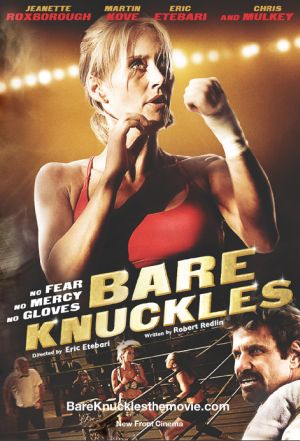 Samantha Rogers (Roxborough) works in a bar, where her no-nonsense approach draws the attention of somewhat shady fight agent Sonny Cool (Kove), who convinces her to try her hand in the world of unsanctioned women’s MMA. While the money’s good, a brutal beating at the hands of current champion Mona (Bridgett Riley) convinces Rogers to give up. However, Cool comes knocking on her door with news of a 16-woman contest with a six-figure, winner take all payout, that would set single-mom Rogers and her disabled daughter (Roxborough’s real daughter) up for life. The bad news is in two parts: it’s no-holds barred, and Mona will also be in the field, along with
Samantha Rogers (Roxborough) works in a bar, where her no-nonsense approach draws the attention of somewhat shady fight agent Sonny Cool (Kove), who convinces her to try her hand in the world of unsanctioned women’s MMA. While the money’s good, a brutal beating at the hands of current champion Mona (Bridgett Riley) convinces Rogers to give up. However, Cool comes knocking on her door with news of a 16-woman contest with a six-figure, winner take all payout, that would set single-mom Rogers and her disabled daughter (Roxborough’s real daughter) up for life. The bad news is in two parts: it’s no-holds barred, and Mona will also be in the field, along with 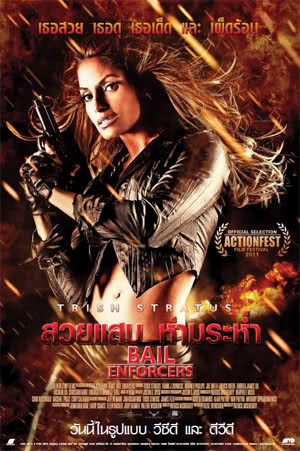 The films put out starring WWE wrestlers are a bit of a mixed bag: some are mindlessly entertaining, while others are near unwatchable. And much the same goes for their Diva’s division: some are actually good wrestlers, others are clearly chosen for their looks. Stratus does probably fall into the former category, but this doesn’t do her adequate justice, and top-billing is probably a bit of a stretch – she’s held hostage more than she kicks ass. She plays Jules, one of three bounty-hunters, who pick up a guy that suggests a deal: let him go, and he’ll point them to a wanted man with a $100,000 reward. They accept, but when taking the guy in, get a call from mob boss Hal Lambino (Rafla) who offers them one million dollars if they deliver the bail-jumper to him instead. Needless to say, the transaction doesn’t go smoothly.
The films put out starring WWE wrestlers are a bit of a mixed bag: some are mindlessly entertaining, while others are near unwatchable. And much the same goes for their Diva’s division: some are actually good wrestlers, others are clearly chosen for their looks. Stratus does probably fall into the former category, but this doesn’t do her adequate justice, and top-billing is probably a bit of a stretch – she’s held hostage more than she kicks ass. She plays Jules, one of three bounty-hunters, who pick up a guy that suggests a deal: let him go, and he’ll point them to a wanted man with a $100,000 reward. They accept, but when taking the guy in, get a call from mob boss Hal Lambino (Rafla) who offers them one million dollars if they deliver the bail-jumper to him instead. Needless to say, the transaction doesn’t go smoothly. After the abomination that was Part 2, I’d filed the third entry under ‘watch whenever I have time’, until a spirited debate on its merits (or otherwise) broke out on over oun our
After the abomination that was Part 2, I’d filed the third entry under ‘watch whenever I have time’, until a spirited debate on its merits (or otherwise) broke out on over oun our 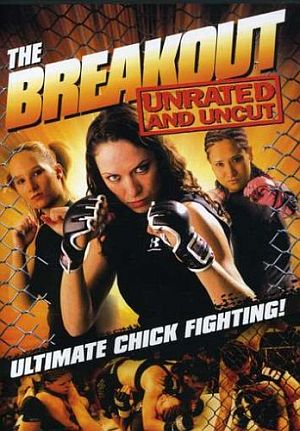 S’funny what you stumble across on Netflix, at the end of a long chain of “See also…” recommendations came this, which according to the
S’funny what you stumble across on Netflix, at the end of a long chain of “See also…” recommendations came this, which according to the 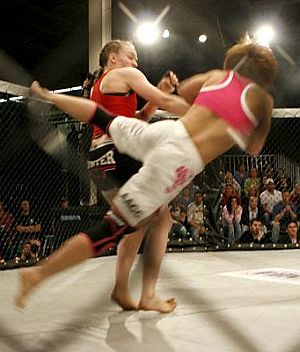 The shortest match of the night – lasting exactly one minute – was a bit unfortunate, as Shayna Baszler actually broke the arm of her opponent, Samantha Anderson. She was applying a submission hold on the arm, but it seemed that Baszler fell forward, resulting in the pressure being made much worse, and resulting in a clean break of her humerus. Ouch. The opening contest [on the DVD – there was an amateur fight not included for some reason] was the only one that lasted longer than one five minute round, with Marissa Inhofer beating Kirsty Bushnell. As well as being the brother of another MMA figher [Nick Inhofer was on The Ultimate Fighter 3] Inhofer was a roller-derby girl, and seemed to have brought a large contingent of her team-mates with her.
The shortest match of the night – lasting exactly one minute – was a bit unfortunate, as Shayna Baszler actually broke the arm of her opponent, Samantha Anderson. She was applying a submission hold on the arm, but it seemed that Baszler fell forward, resulting in the pressure being made much worse, and resulting in a clean break of her humerus. Ouch. The opening contest [on the DVD – there was an amateur fight not included for some reason] was the only one that lasted longer than one five minute round, with Marissa Inhofer beating Kirsty Bushnell. As well as being the brother of another MMA figher [Nick Inhofer was on The Ultimate Fighter 3] Inhofer was a roller-derby girl, and seemed to have brought a large contingent of her team-mates with her.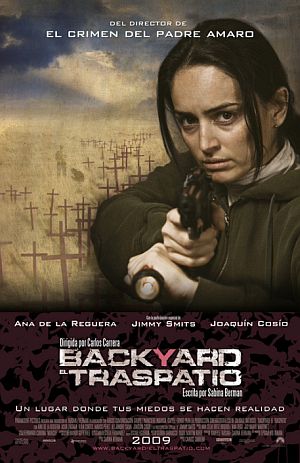 The US border is all that separates El Paso, Texas, from Ciudad Juarez in Mexico, but the two cities’ ways of life are worlds apart. On the Mexican side, the bodies of women turn up, almost every week: sexually assaulted, with signs of torture and/or body parts missing. The police barely bother to investigate; the victims tend to be far from home, low-paid workers in the factories which drive Juarez’s employment. Into this comes police captain Blanca Bravo (de la Reguera), who vows to track down the perpetrators. But doing so pits her against the multinationals who could do without the bad publicity; against her commander, who says to her face that “women make good nurses, but lousy police officers”; and state politicians, who are uneasy about exactly what she might uncover.
The US border is all that separates El Paso, Texas, from Ciudad Juarez in Mexico, but the two cities’ ways of life are worlds apart. On the Mexican side, the bodies of women turn up, almost every week: sexually assaulted, with signs of torture and/or body parts missing. The police barely bother to investigate; the victims tend to be far from home, low-paid workers in the factories which drive Juarez’s employment. Into this comes police captain Blanca Bravo (de la Reguera), who vows to track down the perpetrators. But doing so pits her against the multinationals who could do without the bad publicity; against her commander, who says to her face that “women make good nurses, but lousy police officers”; and state politicians, who are uneasy about exactly what she might uncover.